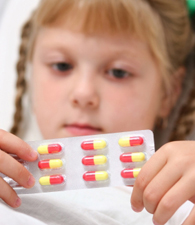What is accidental poisoning?
Accidental poisonings usually involves a young child, ‘accidentally’ poisoning themselves without wanting to cause harm to their body. This is most common in young children as they are keen to explore their world and often learn about new things by putting them in their mouth. Poisoning mostly occurs in children under the age of three, especially boys. They are too young to know the difference between what is safe and what is dangerous.
What causes accidental poisoning?
Most poisonings happen at home. Often the substance is in sight, ready to be used, but unattended by an adult. At other times, children have climbed up high to get something they are interested in, or opened closed cupboards.
Many household items can be poisonous.
- Medications: paracetamol, cold and flu remedies, cough syrup, mouthwashes, vitamins, herbal remedies, antiseptics, antibiotics, sedatives, anti-depressants, heart medications and more.
- Cleaning products: detergents and cleaning sprays, bleaches, washing machine and dishwashing powder, room deodorants, drain cleaners, methylated spirits and turpentine.
- Cosmetics: creams, ointments, shampoos, perfumes and aftershaves.
- Other products: alcohol, cigarettes (if eaten), illicit drugs, essential/aromatic oils, pesticides, car products, glue, batteries and gardening products.
- Poisonous plants: oleander, datura, arum lily, fox glove. Berries, mushrooms and plants with coloured leaves can be attractive to children and harmful.
What are the symptoms?
The symptoms will depend on what your child has swallowed, the amount they have swallowed and their general health.
Some poisons cause only minor symptoms, while others may cause:
- nausea
- vomiting
- drowsiness
- tummy pain
- burns or damage inside the mouth and food pipe (oesophagus).
Some poisons are highly toxic and only a small amount can cause serious problems including fits (seizures), respiratory or cardiac arrest (where the child’s breathing or heart stops), unconsciousness (coma) or death.

Your Baby checkup
what are the vaccinations that he should have taken until now?
Generate a report for my baby.
Track Your Baby Vaccinations
Find Your Baby name
Mohandessin
01002195777
01000012400
0233048350
Beverly Hills
01000012900
0238576831
El Tagamo3
Al Sheikh Zayed
02- 38514031
01000608597


